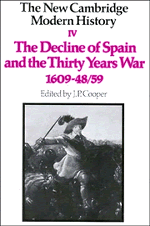Book contents
- Frontmatter
- INTRODUCTORY
- Chapter I General introduction
- Chapter II The European economy 1609–50
- Chapter III The exponents and critics of absolutism
- Chapter IV The scientific movement and its influence 1610–50
- Chapter V Changes in religious thought
- Chapter VI Military forces and warfare 1610–48
- Chapter VII Sea-power
- Chapter VIII Drama and society
- THE CENTRAL CONFLICTS
- THE UNMAKING AND REMAKING OF STATES
- THE FRONTIERS OF EUROPE
- References
Chapter V - Changes in religious thought
from INTRODUCTORY
Published online by Cambridge University Press: 28 March 2008
- Frontmatter
- INTRODUCTORY
- Chapter I General introduction
- Chapter II The European economy 1609–50
- Chapter III The exponents and critics of absolutism
- Chapter IV The scientific movement and its influence 1610–50
- Chapter V Changes in religious thought
- Chapter VI Military forces and warfare 1610–48
- Chapter VII Sea-power
- Chapter VIII Drama and society
- THE CENTRAL CONFLICTS
- THE UNMAKING AND REMAKING OF STATES
- THE FRONTIERS OF EUROPE
- References
Summary
The first decades of the seventeenth century played a special role in the evolution of religious thought. They were neither the seedtime of new ideas about the relationship of God to man nor a time of the discarding of old beliefs, but rather the age in which some of the great issues of religious history were fought out anew. The chief concern of religious thought was one which had never lost interest since the beginnings of Christianity, that of man's free will and of his freedom to arrive at his own religious experiences. This problem was reflected in the controversies over free will and predestination which rent both Calvinism and Catholicism in our period. On another level, it was reflected in the quest for religious individualism against a religious orthodoxy which had become dominant in both Protestantism and Catholicism.
Under the impact of the theological quarrels which centred on these issues, the orthodox and their challengers, as well as those believing either in free will or predestination, took ever more radical positions. Thus some important ideas became re-emphasized. Rationalism penetrated to the very heart of religious thought, bringing the formulation of an explicit rational religion. This period also witnessed a growing trend towards deism and even unbelief. At the other end of the religious spectrum, religious individualism led to pietism and to a renewed mysticism. Beneath the issues raised by such religious thought coursed the piety of the ordinary people. We know almost nothing about this popular piety; yet it cannot be omitted from this account since modes of popular religious expression posed problems which theologians had to meet.
- Type
- Chapter
- Information
- The New Cambridge Modern History , pp. 169 - 201Publisher: Cambridge University PressPrint publication year: 1970
References
- 2
- Cited by



